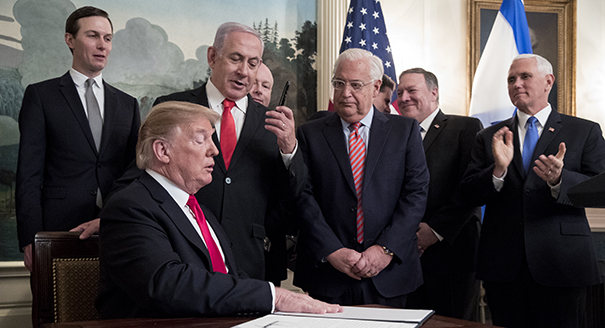President Donald Trump’s recent decision to recognize Israeli sovereignty over the Golan Heights reminded me of an old joke that goes something like this: “I’ve decided to marry supermodel Claudia Schiffer. I want to do it, and my parents are in full agreement. Now all I need to do is to persuade Claudia.”
Israel and the United States have alone decided that the Golan is Israeli. They may soon do so for large parts of the West Bank. Both must now convince the rest of the world. From the early reactions of many countries, that’s not likely to succeed. After Israel annexed the Golan in 1981, the United Nations Security Council, in Resolution 497, unanimously characterized the move as “null and void,” demanding that Israel “rescind” its decision. On Monday, UN Secretary General Antonio Gutteres said that he continued to adhere to all Security Council resolutions on the Golan.
Critics and defenders of the decision have mustered international law and indeed history itself to make their case for or against U.S. recognition of Israel’s annexation. The reality, however, is that Trump’s decision mainly sought to further impose a new framework for Arab-Israeli relations. His administration seeks to replace the “land for peace” formula—that Israel must give up occupied Arab land in exchange for peace with the Arabs—with acceptance that Israel is powerful enough not to have to make any concessions.
Israel’s effort to have the United States recognize its sovereignty over the Golan is a major step in burying the “peace process” of the 1990s. Israel and its American enablers are motivated not by an impulse to reach a more perfect outcome in negotiations, but to shatter the notion of negotiations altogether. They want Israel to use its military superiority and impose a new political reality on the Arab states.
Such thinking was implicit in the remarks of one prominent defender of the Golan decision, the former U.S. National Security Council official Michael Doran. In response to an Inquiring Minds question last July, he observed, “[T]he risk of returning the Golan to Syria is not simply a function of the Assad regime’s alliance with Iran. By its very nature, Syria is an unstable polity. Even if a regime favorable to the United States and to regional stability were one day to emerge in Damascus, we could never count on it to survive.”
What Doran was effectively saying is that all peace negotiations with Syria, or even the Palestinians who suffer from similar instability, are pointless. Instead, Israel must guarantee its security by engaging in defensive expansionism. In other words, for Israel to remain truly secure it must be allowed to acquire more Arab land. The mad ravings of Israel’s Arab nationalist foes in the past—which were denounced as paranoid and ideological—find a striking echo in such a rationale.
What we have here is a latter-day version of the “iron wall” idea defended by the Revisionist Zionist leader Ze’ev Jabotinsky. He argued in an essay in 1923 that Jewish colonization of Palestine had to proceed behind an “iron wall” of Zionist military superiority. The only way that Arabs would agree to the Jewish presence in Palestine, he wrote, “is the iron wall, which is to say a strong power in Palestine that is not amenable to any Arab pressure. In other words, the only way to reach an agreement in the future is to abandon all idea of seeking an agreement at present.” Today, that principle is being expanded by Israel to encompass the Arab world. By abandoning talk of regional peace negotiations now, Israeli military power will shape the Arab response to Israel in the future, one that benefits Israelis.
That is certainly the reasoning that the Trump administration and its Israeli counterparts have adopted. Undermine the position of the Palestinians with regard to East Jerusalem, their refugee status, and contacts with the United States; build relationships with Arab states to circumvent and marginalize the Palestinians; and impose hardship on Palestinian society so that it will become more amenable to Israeli dictates. In that way if eventually there is a settlement with the Palestinians and most Arab states, it will be on Israel’s terms.
The Golan decision follows in this line of thinking. It is a continuation, this time involving Syria, of the U.S. recognition of Israeli sovereignty over East Jerusalem; of the cutting off of funding to the United Nations Relief and Works Agency that assists Palestinian refugees, as well as to U.S. programs funding the Palestinians; and of the closing of the U.S. Consulate in Jerusalem and the Palestine Liberation Organization’s representative office in Washington, D.C. The onesidedness and vindictiveness of those measures, like their long-term implications, suggest they were not made off the cuff, but were part of a carefully considered approach to rewriting the very foundations of Arab-Israeli ties.
They, incidentally, fit in well with the goal of a group of pro-Israel representatives in the U.S. Congress that calls itself the Congressional Israel Victory Caucus. The caucus believes, “[I]t is time to give up on post-modern notions of enrichment and return to the proven concept of victory. Perhaps it’s time for our ally Israel to win, and time for the Palestinians to have a chance to improve their lives.” In other words, the aim embraced by the Trump administration is for Israel to be declared the victor against the Palestinians and abandon the idea that peacemaking requires mutual sacrifices by the Arabs and Israelis.
We’re entering a phase in which Israel will simply refuse to surrender land in exchange for peace with the Palestinians, or indeed the Arabs in general. Yet diplomatic ambiguity is often the best approach to intractable problems. By clarifying matters, Israel and the United States may have made a mistake that they will come to regret. Israel and its supporters like to say that the Palestinian-Israeli conflict and the wider Arab-Israeli conflict no longer matter to most Arabs. They have just ensured that the contrary is true.






